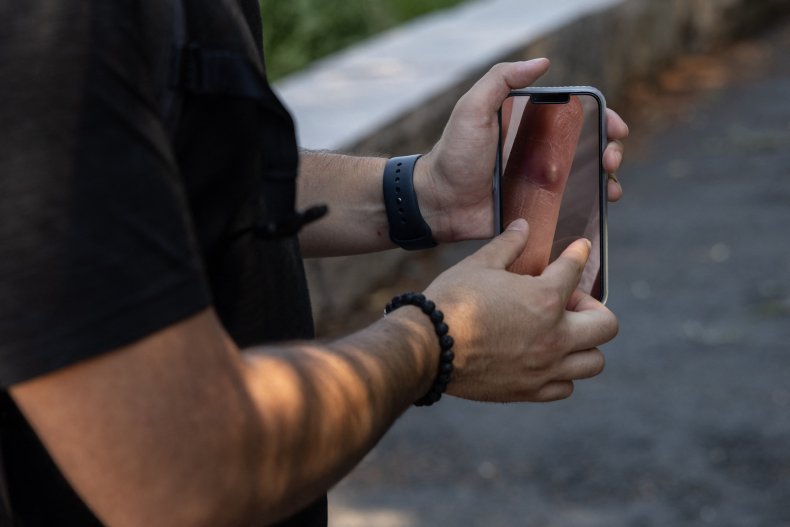BY EMMA MAYER ON 8/12/22
Monkeypox has continued to spread in the U.S. and in countries all over the world, but for the first time, a dog has tested positive after its owners showed symptoms.
It has been unclear whether or not the virus could be spread from human to animal, as the virus is zoonotic, meaning it is more commonly known to spread from animal to human.
However, a recent report from The Lancet showed evidence that two patients, both male who lived together, contracted monkeypox and most likely gave the virus to their 4-year-old Italian greyhound.
The couple arrived at Pitié-Salpêtrière Hospital in Paris, France, on June 10 with symptoms of monkeypox, including rashes and ulcerations, as well as headaches and fevers.
Monkeypox has continued to spread in the U.S. and in countries all over the world, but for the first time, a dog has tested positive after its owners showed symptoms.
It has been unclear whether or not the virus could be spread from human to animal, as the virus is zoonotic, meaning it is more commonly known to spread from animal to human.
However, a recent report from The Lancet showed evidence that two patients, both male who lived together, contracted monkeypox and most likely gave the virus to their 4-year-old Italian greyhound.
The couple arrived at Pitié-Salpêtrière Hospital in Paris, France, on June 10 with symptoms of monkeypox, including rashes and ulcerations, as well as headaches and fevers.

A dog has reportedly tested positive for monkeypox for the first time after its owners both tested positive. Above, Kyle Planck, 26, who has recovered from monkeypox, shows a photo of a rash on his skin during an interview in New York on July 19, 2022.
YUKI IWAMURA/AFP VIA GETTY IMAGES
The report said that 12 days after the onset of symptoms, their dog appeared to have the same scabs and lesions that coincide with monkeypox. Using PCR testing protocol and comparing monkeypox virus DNA sequences from the dog with one of the dog's owners, it was confirmed that the dog had monkeypox.
The report added that the men said they let their dog sleep in their bed but had been carefully isolating their pet from contacting other dogs or humans after they developed symptoms.
The Lancet report said that because the dog also had the monkeypox rash, as well as a positive PCR test, it confirmed that dogs can contract the actual virus instead of being a simple carrier.
"Our findings should prompt debate on the need to isolate pets from monkeypox virus-positive individuals. We call for further investigation on secondary transmissions via pets," the report said.
The report said that 12 days after the onset of symptoms, their dog appeared to have the same scabs and lesions that coincide with monkeypox. Using PCR testing protocol and comparing monkeypox virus DNA sequences from the dog with one of the dog's owners, it was confirmed that the dog had monkeypox.
The report added that the men said they let their dog sleep in their bed but had been carefully isolating their pet from contacting other dogs or humans after they developed symptoms.
The Lancet report said that because the dog also had the monkeypox rash, as well as a positive PCR test, it confirmed that dogs can contract the actual virus instead of being a simple carrier.
"Our findings should prompt debate on the need to isolate pets from monkeypox virus-positive individuals. We call for further investigation on secondary transmissions via pets," the report said.
"This case establishes the possibility of human-to-domestic pet transmission," said Dr. Jonathan Temte, the associate dean for public health and community engagement at the University of Wisconsin School of Medicine and Public Health. Temte told Newsweek that it is hard to determine the likelihood that pets can get monkeypox, however.
"Many species of animals can be infected with monkeypox, but—for the vast majority—we simply do not know how susceptible they are. Furthermore, we do not know the risk for transmission from a pet (such as a dog) to a human," Temte said.
The transmission of monkeypox has been widely up for debate since the Biden administration declared the virus a public health emergency last week, and amid fears of the growing virus, the World Health Organization (WHO) condemned some who were attacking monkeys in response.
"What people need to know very clearly is the transmission we are seeing is happening between humans," WHO spokesperson Margaret Harris said. "The concern should be about where it's transmitting in the human population and what humans can do to protect themselves from getting it and transmitting it. They should certainly not be attacking any animals."
Amesh Adalja from the Johns Hopkins Center for Health Security told Newsweek that because the virus is a zoonotic infection with a source likely to be a rodent of some kind, "it is not surprising that, in certain contexts, humans can pass it on to their pets."
"It does not appear, however, that this is a common phenomenon but one that merits more study," Adalja added. "The danger with monkeypox passing into animals in non-endemic countries is that it allows the virus to establish a domestic reservoir outside of its usual zone of endemicity."
Previously, the virus remained endemic to West and Central Africa.
Dr. Gary Kobinger, director of the Galveston National Laboratory at the University of Texas Medical Branch, told Newsweek, "It is expected that current vaccination regiments that show protection in other animal species, and/or humans, will also work in dogs. This could be one prevention measure to confirm (in dogs) and use."
He added that the isolation recommendation includes isolating oneself from pets.
As of Friday, the Centers for Disease Control and Prevention reported a total of 10,768 confirmed monkeypox cases in the U.S.
Update 8/12/22, 4:40 p.m. ET: This story was updated with a statement from Dr. Gary Kobinger.
No comments:
Post a Comment